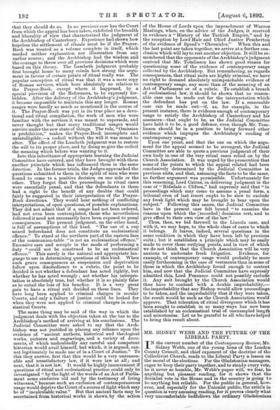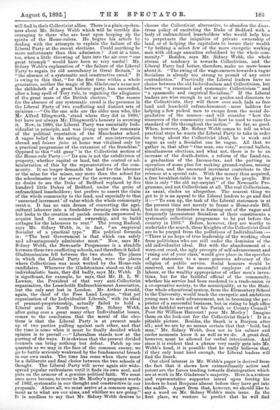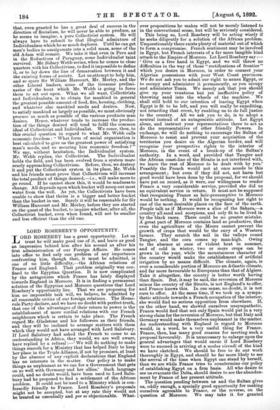MR. SIDNEY WEBB AND THE FUTURE OF THE LIBERAL PARTY.
IN the current number of the Contemporary Beview, Mr. Sidney Webb, one of the young lions of the London County Council, and chief exponent of the doctrine of the Collectivist Church, reads to the Liberal Party a lesson on the moral of the elections. For the Gladstonian managers, eager to keep their party together, and. to steady every vote, be it never so humble, Mr. Webb's paper will, we fear, be anything but pleasant reading, for it shows that the Socialist vote in the House and in the country is going to be anything but reliable. For the public in general, how- ever, and especially for the Unionist public, the artiee in question is very amusing reading, for it proves clearly what very uncomfortable bedfellows the ordinary Gladstonians • will find in their Collectivist allies. There is a plain-spoken- ness about Mr. Sidney Webb which will be terribly dis- couraging to those who are bent upon keeping up the spirits of the Home-rulers. He begins his article by dealing with the attempts to explain the failure of the Liberal Party at the recent elections. Could anything be more unfortunate than this admission? Just at a time, too, when a little throwing of hats into the air over "our great triumph" would have been so very useful ! Mr. Sidney Webb's explanation of "the failure of the Liberal Party to regain its old ascendancy in Great Britain," is "the absence of a systematic and constructive creed." It is owing to this that, "for the first time within a whole generation, neither the magic of Mr. Gladstone's name nor the shibboleth of a great historic party, has succeeded, after a long spell of Tory rule, in regaining the allegiance of the great mass of the British electors." The reason for the absence of any systematic creed is the presence in • the Liberal Party of two conflicting and distinct sets of opinions :—" On the one side are the older men who, like Mr. Alfred Illingworth, stand where they did in 1880,' but have not always Mr. Illingworth's honesty in avowing it. Now, in 1880, the Liberal Party was essentially Indi- vidualist in principle, and was living upon the remnants of the political reputation of the Manchester school. A vague belief in the saving grace of non-intervention abroad and laisser faire at home was vitalised only by a practical programme of the extension of the franchise." Opposed to this "old gang" is the Collectivist section of the Home-rule Party :—" Its aim is not the subdivision of property, whether capital or land, but the control or ad- ministration of this by the representatives of the com- munity. It no longer demands the laud for the labourer or the mine for the miner, any more than the school for the schoolmaster or the sewer for the sewer-man. It has no desire to see the Duke of Bedford replaced by five hundred little Dukes of Bedford, under the guise of enfranchised leaseholders ; but prefers to assert the claim of the whole community to the land, and especially to that unearned increment' of value which the whole community creatis. It has no vain dream of converting the agri- cultural labourer into a freeholder farming his own land, but looks to the creation of parish councils empowered to acquire land for communal ownership, and to build cottages for the labourers to rent." The young Radical, says Mr. Sidney Webb, is, in fact, "an empirical Socialist of a practical type." His political formula is : "The best Government is that which can safely and advantageously administer most." Now, says Mr. Sidney Webb, the Newcastle Programme is a straddle between these two conflicting schools, and therefore it failed. Gladstonianism fell between the two stools. The places in which the Liberal Party did best, were the places where Collectivism was most worked by the Home-rule candidates. Wherever the Gladstonians stood on the old individualistic basis, they did badly, says Mr. Webb. It is significant, for example, he says, that Mr. H. L. W. Lawson, the President of that very anti-Collectivist organisation, the Leaseholds Enfranchisement Association, lost the only seat lost in London. Mr. Arthur Arnold, again, the chief of the Free Land League, "that pet organisation of the Individualist Liberals," with its ideal of peasant-proprietorship, actually failed to hold a Liberal seat in North Dorset. Mr. Sidney Webb, after going over a great many other Individualist losses, comes to the conclusion that the moral of the elec- tions is that the Liberal Party is at present made up of two parties pulling against each other, and that • the time is come when it must be finally decided which opinion is to prevail :—" Liberalism stands now at the parting of the ways. It is obvious that the present divided counsels can bring nothing but defeat. Patch up our quarrels as we may in the face of the common enemy, we go to battle seriously weakened by the fundamental breach in our own ranks. The time has come when there must be a deliberate and final choice between the two schools of thought. The Liberal Party will never again stir wide- spread popular enthusiasm until it finds its own soul, and puts on the armour of a genuine political faith. We must once more become, to recur to Mr. Morley's pregnant words of 1882, systematic in our thought and constructive in our proposals. Above all, we must arrive at a common agree- ment as to what are our aims, and whither we are going." It is needless to say that Mr. Sidney Webb desires to choose the Collectivist alternative, to abandon the disas- trous policy of encircling the Duke of Bedford with a body of enfranchised leaseholders who would help him to perpetuate the iniquities of private ownership of land, or of helping the capitalists to insure their wealth "by bribing a select few of the more energetic working men with old-age annuities subsidised by the whole com- munity." Besides, says Mr. Sidney Webb, the whole stream of tendency is towards Collectivism, and the Liberal Party had better, therefore, make no more bones about it. "The swing of the wage-earners towards a vague Socialism is already too strong to permit of any overt contradiction." Practically the Liberal leaders have no choice between the old Individualism and Collectivism, but between "a reasoned and systematic Collectivism" and "a spasmodic and empirical Socialism." If the Liberal leaders are wise enough to act as guides and directors to the Collectivists, they will throw over such fads as free land and leasehold enfranchisement—mere ladders for helping a few picked men to escape from the social de- gradation of the masses—and will consider "how the resources of the community could best be used to raise the standard of life throughout the nation." So far, so good. When, however, Mr. Sidney Webb comes to tell us what practical steps he wants the Liberal Party to take in order to bring about the Collectivist ideal, he is weak and vague as only a Socialist can be vague. All that we gather is, that after "One man, one vote," second ballots, simultaneous elections, and what not, there is to be an increase of the death-duties, a reform of the Land-tax, a graduation of the Income-tax, and the putting in operation of some plan for making ground-values, mining royalties, and the unearned increment contribute to the revenue at a special rate. With the money thus acquired, a free breakfast-table is to be given to the people. But this is only "the old say-sarpint " of the Newcastle Pro- gramme, and not Collectivism at all. The real Collectivism, as usual, eludes us altogether. The nearest thing we get to it is an appeal to the Liberal leaders to go and find it :—" To sum up, the task of the Liberal statesmen is at the present time not merely to frame a Home-rule Bill, but to occupy themselves in forming out of the vague and frequently inconsistent Socialism of their constituents a systematic collectivist programme to be put before the country in 1893." Before, however, they are worthy to undertake the search, these Knights of the Collectivist Grail are to be purged from the pollutions of Individualism :— "There is no hope of true leadership of the working class from politicians who are still under the dominion of the old individualist ideal. But with the abandonment of a worn-out creed, the ugly precepts of self-advancement and rising out of your class, would give place in the speeches of our statesmen to a more generous advocacy of the religion of public service. Social honours would be reserved, not for the successful employer of sweated labour, or the wealthy appropriator of other men's inven- tions, but for the faithful official of the community, whether his service had been rendered to a trade-union or a co-operative society, to the municipality, or to the State. Our whole educational system, from the Elementary School to the University, would teach the energetic and ambitious young man to seek advancement, not in becoming the pro- prietor of a successful business, but in rising to high office as the faithful servant of his Parish or County Council." Poor Sir William Harcourt ! poor Mr. Morley ! Imagine them on the look-out for the Collectivist Snark ! It is a pitiable picture. Besides, the Snark is a Boojum after all ; and we are by no means certain that that "bold, bad man," Mr. Sidney Webb, does not in his calmer and cooler moments know it as well as we do. A great deal, however, must be allowed for verbal intoxication. And since it is evident that a phrase very easily gets into Mr. Webb's head, it is possible that he really believes that, if they only hunt hard enough, the Liberal leaders will find the Snark.
Our chief interest in Mr. Webb's paper is derived from the fact that it shows how extraordinarily active and potent are the forces tending towards disintegration which are at work in Mr. Gladstone's majority. Here is a,zealous and representative supporter intent upon forcing his leaders to hunt Boojums almost before they have got into the saddle. Apart from that, however, we should like to say a word on Mr. Sidney Webb's main issue. In the first place, we venture to predict that he will find that, even granted he has a great deal of success in the direction of Socialism, he will never be able to produce, as he seems to imagine, a pure Collectivist system. He will always have to submit to that illogical admixture of Individualism which he so much deplores. 'Until he can get men's bodies to amalgamate into a solid mass, some of the old Adam will remain. We take it that even in Peru and in the Reductions of Paraguay, some Individualist taint survived. Mr. Sidney Webb seems, when he comes to close quarters with his Collectivism, to find it impossible to define it, or to lay down the line of demarcation between it and the existing forms of society. Let us attempt to help him, and so spare Sir William Harcourt, Mr. Morley, and the other Liberal leaders, some of the tiresome prelimi- naries of the hunt which Mr. Webb is going to force them to set out upon. What we all want, Collectivists and Individualists, is to obtain for mankind in general the greatest possible amount of food, fire, housing, clothing, and whatever else mankind needs and desires. Now, to satisfy mankind as largely as possible, we must obviously procure as much as possible of the various products man desires. Hence, whatever tends to increase the produc- tion of the things desired will tend to fulfil the common ideal of Collectivist and Individualist. We come, then, to this crucial question in regard to what Mr. Webb calls economic freedom : "What form of social organisation is best calculated to give us the greatest power of satisfying man's needs, and so securing him economic freedom 9" We say, without hesitation, the Individualist system. Mr. Webb replies, the Collectivist. The Individualist holds the field, and has been evolved from a system more nearly approaching Collectivism. Before, then, we destroy it and put the Collectivist system in its place, Mr. Webb and his friends must prove that Collectivism will increase the total product of things desired,—i.e., will make more to go round. If he cannot show this, it would be madness to change. All depends upon which bucket will scoop out most water from the well. As yet, the Collectivists have been unable to show that theirs is a bigger and better bucket than the bucket in use. Surely it will be reasonable for Sir William Harcourt and Mr. Morley, before they are started on the quest of the bucket, to inquire whether, after all, the Collectivist bucket, even when found, will not be smaller and less efficient than the old one.




































 Previous page
Previous page